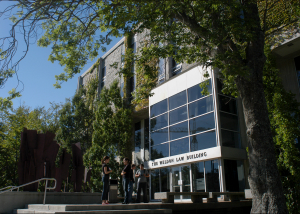The debate over law degree designations has made its way to Dalhousie Law School in Halifax, where the Law Student’s Society will be hosting a debate this week followed by a plebiscite to gather the opinion of students in all three years of the program.
The LSS is taking a neutral stance, says Adam Picotte, vice president (academic) for the society. “What we’re trying to do is facilitate an honest and academic debate on the issue,” he says.
“One of the criticisms that a lot of the students have had is that a lot of schools have just been going forward with this, and it’s been a swelling wave as opposed to a thought-out position.”

The debate, scheduled to take place on Jan. 29, will involve two students and two local practitioners. Picotte says the debaters will be trying to show the pros and cons of each side, so students can be fully informed. It will be followed by a plebiscite in early February.
The results will dictate how the LSS moves forward. If there’s a strong indication of a desire for change, Picotte says the LSS will bring the issue to faculty counsel.
“Faculty counsel will have to get input from other interest groups, like alumni, the local bar society, and such,” says Picotte.
It could be a lengthy process, he says, and the final decision will ultimately rest in the hands of the university’s senate.
Dalhousie law student David Gardos supports a change to the JD. Part of the reason, he says, is the recognition a JD provides for having had prior undergraduate work.
“My reasons supporting a change in degree designation from an LLB to JD primarily stem from a desire to recognize that a law degree in Canada is not a bachelor degree like it is in other parts of the world,” says Gardos, “namely the U.K. and parts of Europe where students enter law school after their final year of high school.”
Third-year student Jennifer Bond says that argument doesn’t stand up for her.
“If I had a BA and an MA but then decided I wanted to go and study biology, I wouldn't kick up because I would be earning a BSc despite my previous training,” she says.
Bond isn’t completely against the change, but says as of yet she hasn’t heard any reason to suggest it’s in a student’s best interest.
“To be honest, my opposition to the JD distinction for Dalhousie is based less on a constructive line of ‘why the LLB is good,’ but rather on the fact that I simply haven't heard any good reasons for the change.”
Other schools across the country have already made the switch, like the University of British Columbia, University of Toronto, University of Western Ontario, and the newest Osgoode Hall Law School. York University’s Senate last week approved a change in Osgoode’s undergraduate law degree designation from the LLB to a JD.
The JD will take effect with Osgoode’s graduating class of 2009, which will convocate in June. A process for alumni who want to change their degree designation will be announced in the fall.
In addition to the straight JD programs, there are schools that offer a joint LLB/JD program, such as the University of Ottawa, and the University of Windsor.
According to Gardos, “the trend with other law schools in Canada reveals support for a designation change as well. On that point I think there should be uniformity within the nation.”
Some students have said a JD will make them more competitive in the American market, since it’s more recognizable to U.S. recruiters. Others don’t believe that’s the case.
“I think if a firm is willing to take a student out of law school from Canada, it will be pretty apprised of the Canadian legal education system,” says Bond.
There’s also the notion that offering a JD is an example of the Americanization of a Canadian tradition.
“Our legal education stemmed from a completely different philosophy of how law should be taught; changing our degree distinction seems to be turning our back on that fact,” says Bond.
“Diluting our history by changing our degree program for no other reason than we think it might placate American firms seems trite.”
Both sides of the argument acknowledge that a JD from a Canadian university does not automatically result in an American Bar Association-approved degree for the purposes of being accredited to write a bar exam in the U.S. (The joint programs offered by Osgoode, the University of Ottawa, and the University of Windsor are an exception to this, since the JD is obtained through partnerships with American universities.)
Either way, Picotte hopes the debate will help to bring out all the issues so students can make an informed decision for the plebiscite vote.
“And that’s something that’s really important to us — that’s why we’re having the debate — we’re trying to supply the students with as much information as possible about this."
4Students wants you to get involved. Do you have a story idea, a profile suggestion, or an upcoming event you think we should cover? Email the managing editor at [email protected]









